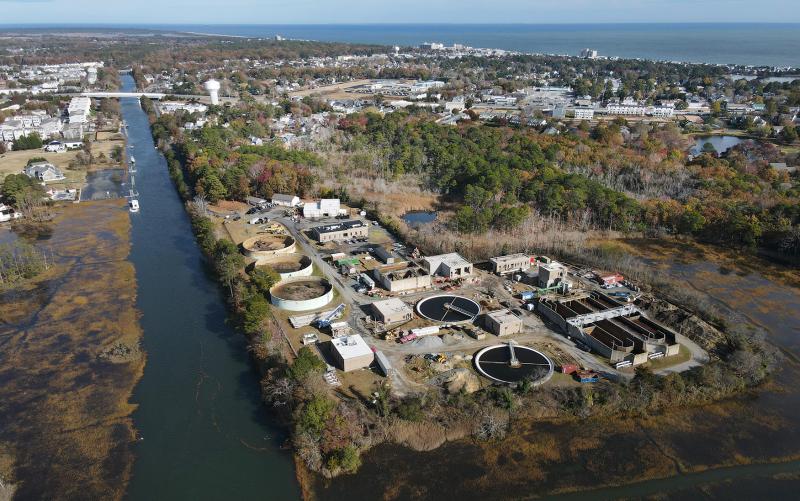Rehoboth: $20M falls short for wastewater deal
In the end, it came down to money, and $20 million wasn’t enough.
During a Feb. 21 meeting, Rehoboth Beach commissioners voted 5-2 against continuing to move forward with the possible creation of a wastewater partnership among the city, Sussex County and the Lewes Board of Public Works. The proposed partnership would have allowed the county to connect its Wolfe Neck Regional Wastewater Facility to the city’s ocean outfall and pump up to 5 million gallons per day through the outfall. In return, the county was willing to pay the $20 million, and fund all necessary testing, any outfall modification expenses, and all future outfall operations and maintenance.
County and Lewes BPW officials approached Rehoboth this summer about creation of the partnership because Lewes needs a new wastewater treatment facility. In addition to the monetary considerations, part of the pitch was environmental – removing Lewes’ wastewater outfall from the Lewes-Rehoboth Canal.
Most recently, during a meeting in December, commissioners voted in favor of moving forward with continued discussions.
During the Feb. 21 meeting, City Manager Taylour Tedder said city staff have been negotiating with the county since December. Ultimately, this is what the county is willing to offer, he said.
The only change from before was that the county said it was willing to provide roughly $9.5 million up front for construction of two future phases of the city’s wastewater treatment plant upgrade project.
Sussex County Administrator Todd Lawson said the remaining portion of the $20 million would be given to the city once all the necessary permits and paperwork were in place.
County Finance Director Gina Jennings said the county had a cheaper option than connecting to the Rehoboth outfall, and going above the $20 million offer would not be fair to the county’s ratepayers. The county has to do what’s right for its ratepayers, too, she said.
Tedder said he needed to know from commissioners if the $20 million was an acceptable amount because if it was, he would then need to engage the services of an environmental lawyer to make sure the agreement was done correctly.
Ultimately, commissioners didn’t think the amount was enough.
The existing contract calls for the city and county to split costs related to the wastewater treatment plant two separate ways – through operations and management, and through debt. The operations and management costs are split on usage, while the county pays for 42% of the debt expenses.
Commissioner Craig Thier said he had concerns about the debt portion because the county would soon be using more than 42% of the flow going through the outfall. If there’s debt taken on, under the current contract, the city would be paying more for its share, he said.
The existing contract also calls for the county to contribute to a reserve account that would be used in case of an emergency.
That account should have millions of dollars in it, but there’s only $130,000, and that’s a problem, said Thier.
Commissioner Suzanne Goode has been against the proposal from the very beginning, before she was a commissioner. She wanted commissioners to walk away from the proposal this past summer, she said.
Mayor Stan Mills and Commissioner Edward Chrzanowski were the two favorable votes.
Similar to before, Mills said he thought the county had been a good partner in the past and would be in the future.
Chrzanowski said he thought the city was missing out on a huge financial opportunity.
Members of the public spoke both for and against the proposal at the meeting.
Property owners Jan Konesey and Jay Lagree said the $20 million was not anywhere near enough.
If this is approved, Rehoboth will be on the hook for all the peril and all the impact, but none of the benefits, said Konesey.
Fellow property owners Pat Coluzzi and Carolyn and David Diefenderfer spoke in favor of continuing toward the connection.
The outfall was built with the extra capacity in place, said Coluzzi.
Following the decision, Lawson said he was disappointed, but the county would continue to work with the city under the current arrangement in good faith. The cheaper option is to rebuild for Lewes at the Wolfe Neck facility and then pump the treated effluent into the canal, he said.
Looking forward, Lawson said the county would be working with Lewes officials to figure out the next steps.
Chris Flood has been working for the Cape Gazette since early 2014. He currently covers Rehoboth Beach and Henlopen Acres, but has also covered Dewey Beach and the state government. He covers environmental stories, business stories and random stories on subjects he finds interesting, and he also writes a column called Choppin’ Wood that runs every other week. He’s a graduate of the University of Maine and the Landing School of Boat Building & Design.























































